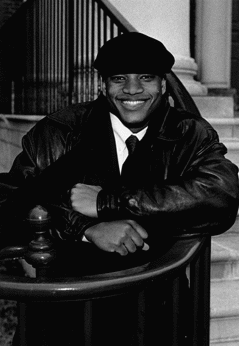|
|
A&S Student Is a Rhodes ScholarWes Moore is one of 32 chosen nationwide from among 950 applicants
By Dennis O'Shea |

The interview had been tough. The questions were challenging, designed as much to see how you would react as to elicit information.
The competition was tough too. Anyone in the room, Wes Moore had concluded, was a more than reasonable choice for a Rhodes Scholarship.
"You were thinking you had done pretty well, but not feeling as confident as you should," Moore recalled later.
 |
| At Oxford, Westley Moore hopes to earn a master of philosophy degree in international relations. |
Then, after deliberating, the selection committee for a six-state area including Maryland was ready to announce the four Rhodes winners for its district.
"I wasn't actually expecting it," Moore said of his reaction to his selection. "They pulled us all in and I was the third name called and I was totally shocked. I almost wanted them to repeat it to make sure they got it right."
No recount necessary. Westley Moore, a Johns Hopkins senior from Pasadena, Md., had been selected as a Rhodes Scholar, one of 32 chosen nationwide from among 950 applicants at 327 colleges and universities.
Rhodes Scholarships, among the most prestigious in the world, provide winners with two or three years all-expense-paid study at Oxford University in England. Moore hopes to earn a master of philosophy degree in international relations, and is particularly interested in researching refugee issues at Oxford's Refugee Studies Center. Eventually, he would like to work in the State Department and have the ear of the nation's top foreign policy officials.
"All the [Rhodes candidates] were outstanding, wonderful people and smart and talented," Moore said. "Having the chance to interact with [the other scholarship winners] on a daily basis is going to be a remarkable experience."
Moore, an international relations major minoring in economics, is a first lieutenant in the U.S. Army Reserve and a student representative in the Johns Hopkins undergraduate admissions office. He played wide receiver on the Blue Jay football team and serves on the board of directors of the Central Maryland Chapter of the March of Dimes. He is creating a mentoring program for Baltimore youth who have gotten in trouble with the law.
He is the first Rhodes Scholarship winner from Johns Hopkins since 1988. Among the class of scholars selected Dec. 9, he is the only winner from Maryland and one of only two studying at a Maryland institution.
Moore, 22, transferred to Johns Hopkins in 1998 after graduating with an associate's degree from Valley Forge Military Academy and College in Pennsylvania, where he was regimental commander and cadet of the year. He completed airborne school at Fort Benning, Ga., and is a certified paratrooper. He will begin his Army Reserve active duty obligation at military intelligence school in Arizona this spring and summer.
At Johns Hopkins, he has served as chairman of the Men of the NAACP and as one of 30 undergraduates who work as admissions representatives, interviewing prospective freshmen. He is working with the Baltimore City public defender's office to found a service program called Students Taking a New Direction, or STAND, to pair students from Johns Hopkins and other colleges with juveniles who have been arrested and would benefit from mentoring. He expects to devote full time to the project between completion of his Johns Hopkins degree requirements this month and his departure for Army training in April.
As a wide receiver on this year's 5-5 Johns Hopkins football team, he caught eight passes, including one for 51 yards, and scored two touchdowns.
Moore, raised in the Bronx, also attended Valley Forge Military Academy for secondary school, graduating in 1996. He moved to Maryland several years ago when his mother's employer, the Annie E. Casey Foundation, relocated to Baltimore.
The Rhodes Scholarships were created by the will of British colonialist and statesman Cecil Rhodes, who died in 1902. His aim was to bring together young students with leadership potential from throughout the English-speaking world for advanced study at Oxford, personal development and exposure to cultures other than their own. He hoped, according to the Rhodes Scholarship Trust, to promote international understanding and peace.
The selection criteria for Rhodes Scholars include intellectual achievement, concern for others, character, leadership potential and "physical vigor." In all, Rhodes Scholars are selected from 19 countries or regions of the world, though the U.S. contingent is the largest.
Related Web Site
Office of the American Secretary, Rhodes Scholarship Trust
| GO TO DECEMBER 18, 2000 TABLE OF CONTENTS. |
| GO TO THE GAZETTE HOME PAGE. |